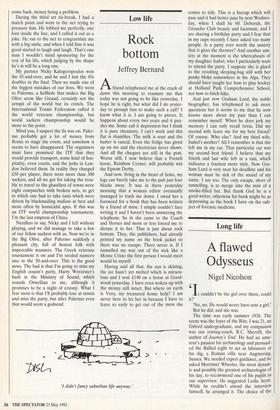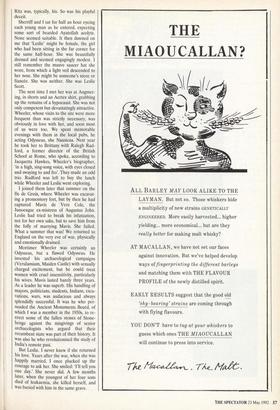Long life
A flawed Odysseus
Nigel Nicolson
It couldn't be the girl over there, could it?'
`No, no. He would never have sent a girl.' But he did; and she was.
The time was early summer 1938. The scene was the foyer of the Ritz. I was 21, an Oxford undergraduate, and my companion was our rowing-coach, R.C. Sherriff, the author of Journey's End. He had an ama- teur's passion for archaeology and persuad- ed the Balliol eight to act as labourers at his dig, a Roman villa near Angmering, Sussex. We needed expert guidance, and he asked Mortimer Wheeler, the most dynam- ic and possibly the greatest archaeologist of his day, to recommend one of his pupils as our supervisor. He suggested Leslie Scott. While he couldn't attend the interview himself, he arranged it. The choice of the
Ritz was, typically, his. So was his playful deceit.
Sherriff and I sat for half an hour eyeing each young man as he entered, expecting some sort of bearded Ayatollah acolyte. None seemed suitable. It then dawned on me that 'Leslie' might be female, the girl who had been sitting in the far corner for the same half-hour. She was beautifully dressed and seemed engagingly modest. I still remember the mauve saucer hat she wore, from which a light veil descended to her nose. She might be someone's niece or fiancée. She was neither. She was Leslie Scott.
The next time I met her was at Angmer- ing, in shorts and an Aertex shirt, grubbing up the remains of a hypocaust. She was not only competent but devastatingly attractive. Wheeler, whose visits to the site were more frequent than was strictly necessary, was obviously in love with her, and soon most of us were too. We spent memorable evenings with them in the local pubs, he acting Odysseus, she Nausicaa. Next year he took her to Brittany with Ralegh Rad- ford, a former director of the British School at Rome, who spoke, according to Jacquetta Hawkes, Wheeler's biographer, `in a high, sing-song voice, with eyes closed and swaying to and fro'. They made an odd trio. Radford was left to buy the lunch while Wheeler and Leslie went exploring.
I joined them later that summer on the Ile de Groix, where Wheeler was excavat- ing a promontory fort, but by then he had captured Mavis de Vere Cole, the Junoesque ex-mistress of Augustus John.
Leslie had tried to break his infatuation, not for her own sake, but to save him from the folly of marrying Mavis. She failed.
What a summer that was! We returned to England on the very eve of war, physically and emotionally drained.
Mortimer Wheeler was certainly an Odysseus, but a flawed Odysseus. He invested his archaeological campaigns (Verulamium, Maiden Castle) with sexually charged excitement, but he could treat women with cruel insensitivity, particularly his wives. Mavis lasted barely three years. As a leader he was superb. His handling of mayors, politicians, students, Indians, exca- vations, wars, was audacious and always splendidly successful. It was he who per- suaded the Ancient Monuments Board, of which I was a member in the 1950s, to re- erect some of the fallen stones of Stone- henge against the misgivings of senior archaeologists who argued that their recumbent state was part of their history. It was also he who revolutionised the study of India's remote past.
But Leslie. I never knew if she returned his love. Years after the war, when she was happily married, I once plucked up the courage to ask her. She smiled: 'I'll tell you one day.' She never did. A few months later, when the youngest of her four sons died of leukaemia, she killed herself, and was buried with him in the same grave.



































































 Previous page
Previous page